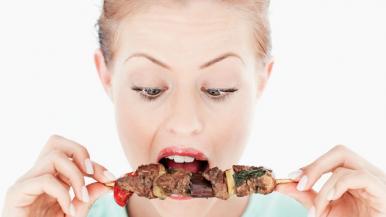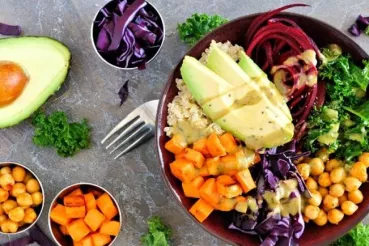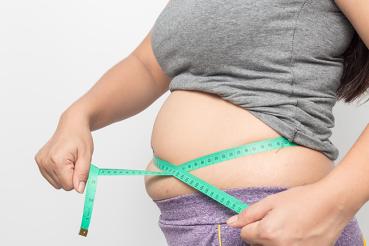These days, many people turn to high-protein, low-carbohydrate diets to shed unwanted pounds.
But is a protein-packed plan that forces you to forsake virtually all carbs the best way to lose weight and, more important, keep it off?
Here, Rush dietitian Jennifer Ventrelle, MS, RDN, CPT, discusses whether there's such a thing as too much protein — and whether curbing the carbs can do more harm than good.
Are low-carb diets safe?
I don't think it's as simple as just saying, "Yes, it's safe," or "No, it's not." What I would say is that it can be safe when done properly.
It's my understanding that when diets like Atkins first came about, the instructions were: You can eat whatever you want, just don't eat any carbs. And people took that to mean, "Oh, I can eat tons of bacon and steak and cheese."
But when you do that, you're driving your saturated fat up. If you tell someone they have free rein and can eat as much protein as they want, there's some risk there because they're likely increasing saturated fat intake.
Today, most people understand that you have to choose proteins that are lower in saturated fat. But even if so, there are still health risks associated with a diet that severely restricts carbohydrates for more than just a few months.
So I think someone would have to be paying really close attention and would need professional guidance from a physician and nutrition expert to be able to do a low-carb diet safely.
The effects of cutting out carbs.
We get our calories, our fuel, from three sources: protein, carbohydrates and fats.
Any carbs you eat that aren't used right away for energy are stored in the muscle as glycogen or processed through the liver and converted to fat. Glycogen, or the storage form of carbohydrate, is the first source of energy that you use for physical activity.
If you don't eat adequate amounts of carbs, you deplete your glycogen. And when your body can’t use the carbohydrates in your muscles, it will start to break down the protein in your muscles for fuel.
Doing this for more than a few months — especially when trying to maintain an active lifestyle — can become dangerous. Under these conditions, the body is more likely to store fat, slow its metabolism, and be at risk for dehydration, muscle aches and fatigue.
That's why it's not safe for anyone who engages in regular exercise to be on a severely carb-restricted diet. You're going to start breaking down your muscle tissue. And you won't have enough energy to get through the workouts that are going to be beneficial for heart and lung health, cancer prevention, bone density and overall fitness.
The risks of beefing up on protein.
Protein is a really big molecule, and it has to filter through your kidneys. So there was an initial fear, back when high-protein diets started to pop up,that people who consumed excessive protein might be leading themselves on a path toward kidney damage.
You can't really study this kind of thing, though, because it's unethical to say, "Let me feed you a bunch of protein and see if you go into kidney failure."
But according to the National Institute of Diabetes and Digestive and Kidney Diseases, diets high in animal proteins — like those found in meats and fish — could be a problem for people with compromised kidney function, since the body already has trouble metabolizing waste products.
And because uric acid is a byproduct of protein, a high-protein diet in someone who is susceptible to gout could lead to flare-ups. If you have impaired renal function and aren't on dialysis yet, too much protein can accelerate kidney damage, leading to kidney failure.
So I would say if you have any history of kidney problems or kidney stones, you should check with your doctor to see if a protein restriction is necessary. For this type of individual, a low-carb diet would not be a good choice.
Some of these diets claim that if you cut out carbs, you'll lose 5 pounds in two days. Well, you didn't lose 5 pounds of fat mass in two days.
Low-carb diets and rapid weight loss.
Glycogen tends to hold onto water. So if you don't have a lot of glycogen, you're not retaining water. In the initial phases of high protein, low-carb diets, people see the numbers on the scale go down, but a lot of that is really that they're intramuscularly dehydrated — their muscles aren't holding onto water.
That's one reason why some of these diets claim that if you cut out carbs, you'll lose 5 pounds in two days. Well, you didn't lose 5 pounds of fat mass in two days. The number on the scale is lower, and admittedly you look thinner because your belly also tends to retain more water when you eat carbohydrates.
All of those flat belly diets, that’s how they work: If you don't eat carbs, you don’t have a lot of water in your belly, so you don't look bloated.
The challenges of staying the course.
Low-carb diets are extremely hard to sustain because people look at cutting carbs as restricting themselves. And what do you want when someone tells you that you can't have something? The exact thing you can't have.
So behaviorally, it's not realistic to think that someone could stick to something like severely limiting carbs long-term.
What I recommend is that you stay moderately low on the carbs most of the time. In the Prevention Center, we call it "the Perfect Plate": Half the plate should be nonstarchy vegetables (like spinach, green beans, broccoli, bell peppers and cauliflower); one-fourth of the plate should be protein; and one-fourth of the plate should be healthy carbs.
The United States Department of Agriculture plate actually has four categories — they say a quarter plate of nonstarchy vegetables and a quarter plate fruit — but I prefer half a plate of vegetables.
The more veggies, the better.
Vegetables are low in carbs and high in fiber, which is what you want if you're trying to lose weight. The fiber and water content of vegetables take up a lot of space and feel heavy in the stomach.
The hypothalamus — the area in your brain that receives the signal for you to stop eating — gets that "full" message in response to the weight and volume of the food in your stomach. If you eat lots a lot of veggies, the brain will receive that message sooner, you will feel fuller, and you'll be more likely to not want to eat as many carbs.
Should fruit be forbidden?
Don't skip the fruit. One of the big down sides when you're cutting out carbs is that all fruit, no matter what type of fruit it is, contains carbohydrates.
But fruit is also healthy. We have many studies that show fruits, vegetables and whole grains — especially oats — are important in cancer prevention, heart health, cholesterol reduction and maintaining a healthy weight.
You can always use fruit as the carbohydrate on your plate. Just make sure you pay attention to the portion size. If you're using a bigger plate, that quarter plate could end up being too large. I always say you should have about a fistful of carbs and a palm-sized portion of protein at each meal. Budget with your fist for all carbs — including fruit.
The final word on low-carb diets.
I would say the best advice I can give is to avoid extremes.
Make sure you're getting enough protein to ensure good health, but don't make it the centerpiece of your diet. Don't gorge on carbs, but don't eliminate them, either. And lastly, load up on the veggies!
It's become such a cliché — moderation and finding a balance. But when you look at all the components of both weight loss and weight maintenance, that's really what it's about: finding behaviors that you can stick with and that don't feel like deprivation.
I'm also a big advocate of not cutting out everything you love. People will say things like, "I’m not going to eat cake ever again," or "I'm swearing off chips forever." Well, that's probably not true. If you eat cake or chips every day now, it's unrealistic to think that you'll never have them again.
So instead of deprivation, look at making improvements. How often are sweets a part of your normal routine now? If it's every day, cutting back to two or three days a week is an improvement. If you eat chips with lunch every day, substituting a salad or moving to the smaller size bag of chips will be more realistic than swearing them off for life.
Think about it this way: If you're going to try to change something, ask yourself, "Can I do this forever?" If the answer is no, you probably want to rethink what you're trying to do.




